InvestorPlace - Stock Market News, Stock Advice & Trading Tips
It’s expected that the world population will increase to 9 billion by fiscal year 2050. To feed the world, some say food production must increase by 70%. This is a big challenge considering concerns around global warming and erratic weather conditions. However, with every challenge there are opportunities. One way to resolve the potential food-shortage crisis is vertical farming. As this idea gains traction, farming stocks should start to look more and more attractive.
For an overview, vertical farming involves growing crops in stacked layers. The method uses up to 80% to 90% less water compared to regular farming methods. It can also be soil-less and employ techniques such as hydroponics, aquaponics and aeroponics.
With several advantages over traditional farming, the vertical farming market is expected to grow at a compound annual growth rate (CAGR) of 25.2% through fiscal year 2027. The market size is also expected to touch $31.6 billion by the end of the decade. This presents a big opportunity for farming stocks with a focus on vertical farming methods.
So, let’s take a look into seven interesting farming stocks that are likely to make it big in the vertical farming segment.
- Kalera (OTCMKTS:KSLLF)
- Appharvest (NASDAQ:APPH)
- Hydrofarm Holdings (NASDAQ:HYFM)
- Spring Valley Acquisition (NASDAQ:SV)
- Village Farms International (NASDAQ:VFF)
- GP Solutions (OTCMKTS:GWPD)
- Cubicfarm Systems (OTCMKTS:CUBXF)
Vertical Farming Stocks to Buy: Kalera (KSLLF)
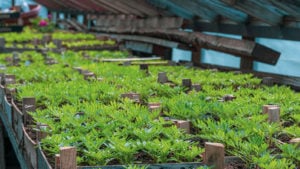
Source: Silga Bauge-Robezniece / Shutterstock.com
Kalera is a Norwegian vertical farming company that’s primarily focused on sustainably growing pesticide-free, non-GMO produce. KSLLF stock is currently traded over the counter. However, in December 2020, the company engaged Bank of America’s (NYSE:BAC) Bofa Securities for a potential listing on a main exchange through a special purpose acquisition company (SPAC).
In fiscal year 2020, Kalera opened its first farming facility in Orlando. The company has also announced an ambitious plan for six new facilities in the United States. Additionally, Kalera has acquired more than 50 customers, including Sysco (NYSE:SYY), US Foods (NYSE:USFD), Freshpoint and Marriott (NASDAQ:MAR).
For 2020, Kalera reported revenue of $887,000. However, once all of its new facilities are operational by the first quarter of 2022, production capacity is expected to increase by 12 times. Therefore, this company is positioned for strong growth. Further, Kalera’s potential listing on a main exchange will add to its financial flexibility as it pursues more expansion.
Finally, in February, the company also acquired Vindara to “optimize seed breeding.” The company believes that this acquisition will help “increase both crop yield and the speed of growth cycles in its current and future facilities.”
With big growth plans, this pick of the farming stocks looks attractive for the long term. The stock seems to be flying under the radar, but current levels are ideal for fresh exposure.
Appharvest (APPH)
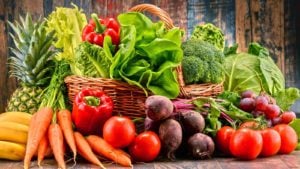
Source: monticello/ShutterStock.com
APPH stock recently listing through a SPAC business combination and traded for as high as $42.90 in early February. However, it has since trended lower, changing hands at $15.18 today. At a current market capitalization of $1.38 billion, the name seems attractive among farming stocks.
Appharvest is in the business of large-scale controlled indoor farms. The company currently has a 60-acre facility, which is among the largest indoor farms in the United States.
Furthermore, Appharvest has a development pipeline expected to reach 525 acres by 2025 (Page 38). Once these facilities are operational, a strong surge in revenue is likely. The company expects first revenue in the current year.
But that’s not all. This company has also secured partnerships with leading grocers, such as Costco (NASDAQ:COST), Target (NYSE:TGT), Kroger (NYSE:KR) and Walmart (NYSE:WMT). Therefore, once production commences, sales are unlikely to be a challenge.
The company expects revenue of $21 million for 2021. Net revenue is also guided to increase to $387 million by fiscal year 2025. For the same period, the company expects EBITDA of $122 million. Therefore, margins are likely to be attractive and the business has the potential to deliver robust free cash flows.
Finally, in April, Appharvest acquired an “agricultural robotics and artificial intelligence company” called Root AI. With the acquisition, it expects to increase its farming efficiency and sustainability.
Hydrofarm Holdings (HYFM)
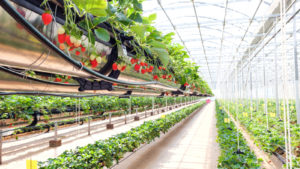
Source: shutterstock.com/Zapp2Photo
After touching a 52-week high of $95.48, HYFM stock has corrected to today’s price of around $62. In my view, this correction provides an attractive entry opportunity for investors looking to get into farming stocks.
Hydrofarm is in the business of manufacturing and distributing controlled environment agriculture (CEA) equipment and supplies. As such, the company’s growth is directly related to growth in the vertical farming industry.
And this name is already on a healthy growth trajectory itself. For fiscal 2020, Hydrofarm reported revenue of $342.2 million, which was higher by nearly 46% year-over-year (YOY). Further, the company was adjusted EBITDA positive, a notable improvement from its EBITDA loss in 2019.
For 2021, Hydrofarm expects organic sales growth of 20% to 25%. Considering the industry growth outlook, top-line growth above 20% is likely in the next few years.
It’s also worth noting that in March, the company rolled out six new products for sustainable indoor farming. Continued product launches coupled with strategic partnerships with vertical farming companies should help HYFM deliver positive long-term results.
According to Hydrofarm, the total addressable market (TAM) for its products is roughly $8 billion (Page 88). Therefore, there is ample headroom here.
Finally, a point worth mentioning is that this company stands to benefit from strong growth in the cannabis industry. In the coming years, this could be a potential game-changer for Hydrofarm.
Spring Valley Acquisition (SV)

Source: Dmitry Demidovich/ShutterStock.com
Next up on this list of top farming stocks to buy is a SPAC called SV stock. In March 2021, Aerofarms announced that it would go public through a business combination with Spring Valley Acquisition.
This SPAC merger is expected to close in Q2 2021 at a pro forma equity valuation of $1.2 billion. Aerofarms will be mopping up gross proceeds of $357 million from the transaction.
As an overview, Aerofarms claims to be a “world leader” in vertical farming. The company has grown over 550 varieties of fruits and vegetables and has been able to differentiate itself with its investments in technology.
Currently, the company has 13 issued patents, 38 pending patent applications and 46 designated trade secrets. This technology is reflected in the company’s superior crop yield, low water usage and fast crop turnover.
From a revenue perspective, Aerofarm expects $13 million for fiscal 2022. Revenue is also expected to accelerate to $553 million by fiscal 2026. For that same year, the company expects EBITDA of $193 million. Given the SPAC business combination, Aerofarm will also likely have ample financial flexibility to help accelerate this growth.
Village Farms International (VFF)
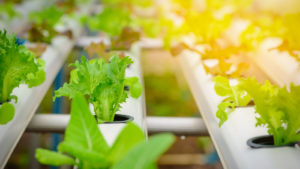
Source: shutterstock.com/Nuttawut Uttamaharad
VFF stock is another quality name among farming stocks. The name has surged by 241% in the last one year. However, further upside seems likely from current levels of around $11
Village Farms has 30 years of experience in “developing and operating mega-scale greenhouses.” In fact, the company has roughly 500 acres of greenhouse operation and recorded $157 million in sales for fiscal 2020. This company’s farming also uses 86% less water and 97% less land as compared to outdoor farming (Page 6).
VFF also happens to be an attractive cannabis play. Pure Sunfarms, which is owned by Village Farms, is the “lowest-cost producer among Canadian greenhouse/indoor [cannabis] producers.” Currently, Pure Sunfarms’ cannabis products include dried cannabis flower, gummies, vapes and oils.
So, with the U.S. moving toward full federal legalization, VFF stock is a farming stock as well as cannabis play. Because of that, it’s not surprising that it has surged so much.
For fiscal 2020, the company reported total sales of $170.1 million, a roughly 18% increase YOY. Moreover, adjusted EBITDA for the same period increased by 722% to $7.4 million. If operating level profit continues to growth at a healthy pace, the company will likely maintain this kind of positive momentum.
GP Solutions (GWPD)
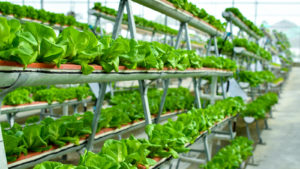
Source: shutterstock.com/mustbeyou
GWPD stock is one of the riskier farming stocks on this list. Right now, it trades with a market cap of just $70 million. However, with positive industry tailwinds, some exposure to this name can be considered.
GP Solutions is a provider of “growing systems for specialty leaf crops and herbs.” Some of the products it offers include “hydroponic based pod[s]” and soilless growth mediums.
Back in late October, GP entered into an agreement with Advanced Container Technologies (OTCMKTS:ACTX) to “sell and distribute GP’s products in the United States and its territories.” As the company’s product visibility increases through deals like this, revenue will likely trend higher.
It’s also worth noting that the company announced it had entered into research and development for growing strawberries back in January. GP expects to begin cultivation of the fruit soon, which has a market size of $18.37 billion. Therefore, the company seems to be moving toward its own vertical farming operations, too.
GWPD stock still remains thinly traded and big exposure should be avoided here. However, the company seems to be moving in the right direction. If current plans are well executed, the stock can deliver multi-fold returns.
Cubicfarm Systems (CUBXF)
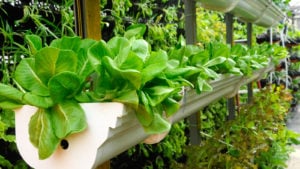
Source: shutterstock.com/Aisyaqilumaranas
Among the small-cap farming stocks and the last entry on this list, CUBXF stock has been an out-performer lately. The stock has surged by 269% in the past one year.
Cubicfarm Systems is a manufacturer and seller of modular growing systems with patented and patent-pending technologies. Back in 2019, the company acquired Hydrogreen, which is “a manufacturer of fully automated hydroponic growing systems that produce live, green animal feed.” On top of that, though, the company also owns Cubicfarm Produce, a subsidiary that produces lettuce and microgreens. Therefore, Cubicfarm Systems seems well diversified.
To close, it’s also worth noting that it has been on a fundraising spree lately. In December 2020, the company closed a $16.2 million equity offering. Later, this April, it closed a $1.5 million private placement. With that kind of liquidity buffer, CUBXF seems well positioned to accelerate its growth.
On Penny Stocks and Low-Volume Stocks: With only the rarest exceptions, InvestorPlace does not publish commentary about companies that have a market cap of less than $100 million or trade less than 100,000 shares each day. That’s because these “penny stocks” are frequently the playground for scam artists and market manipulators. If we ever do publish commentary on a low-volume stock that may be affected by our commentary, we demand that InvestorPlace.com’s writers disclose this fact and warn readers of the risks.
Read More: Penny Stocks — How to Profit Without Getting Scammed
On the date of publication, Faisal Humayun did not have (either directly or indirectly) any positions in any of the securities mentioned in this article.
Faisal Humayun is a senior research analyst with 12 years of industry experience in the field of credit research, equity research and financial modelling. Faisal has authored over 1,500 stock specific articles with focus on the technology, energy and commodities sector.
The post 7 Vertical Farming Stocks Feeding the World appeared first on InvestorPlace.
The views and opinions expressed herein are the views and opinions of the author and do not necessarily reflect those of Nasdaq, Inc.


